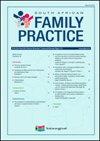自由州大学四年级医学生的当地语言能力
IF 1.2
Q2 MEDICINE, GENERAL & INTERNAL
引用次数: 0
摘要
背景:语言能力有利于医患沟通和健康结果。沟通不畅可能导致医生误诊和/或患者不遵医嘱。本研究旨在评估医学生对当地最常用语言的掌握程度:这项横断面研究于 2019 年在自由州大学 (UFS) 的 119 名四年级医学生中进行。对学生的塞索托语和南非荷兰语水平进行了测试,因为这两种语言是自由州省使用最广泛的语言。这项研究包括两个阶段:学生填写一份自填问卷,对自己的两种语言水平进行自我评价,然后进行电话访谈,其中包括一系列水平测试问题:在119名四年级医学生中,96名学生(80.7%)完成了自填问卷。46名学生(47.9%)将自己的南非荷兰语评为高级或精通,而只有23名学生(23.9%)将自己的塞索托语评为高级或精通。只有 28 名学生随后接受了访谈。他们的实际语言水平与自我评价相符:研究结果表明,有必要在医科本科生的课程中针对当地最常见的语言加强语言技能培训。我们还发现,学生准确地报告了他们的语言能力:贡献:研究结果加强了在本科医学生课程中针对当地常见语言进行语言技能培训的必要性。本文章由计算机程序翻译,如有差异,请以英文原文为准。
Local language proficiency of fourth-year medical students at the University of the Free State
Background: Language proficiency is beneficial for doctor–patient communication and health outcomes. Poor communication can lead to misdiagnosis by the doctor and/or non-adherence from the patient. This study aimed to evaluate medical students’ proficiency in the most commonly spoken local languages.Methods: This cross-sectional study was conducted in the class of 119 fourth-year medical students at the University of the Free State (UFS) in 2019. Students’ proficiency was tested for Sesotho and Afrikaans, as these are the most widely spoken languages in the Free State province. The study consisted of two phases: completing a self-administered questionnaire where students self-rated their proficiency in the two languages, followed by telephonic interviews consisting of a series of proficiency-testing questions.Results: Of the 119 fourth-year medical students at UFS, 96 (80.7%) completed the self-administered questionnaires. Forty-six students (47.9%) rated themselves as either advanced or proficient in Afrikaans, whereas only 23 students (23.9%) rated themselves as advanced or proficient in Sesotho. Only 28 students were subsequently interviewed. Their actual language proficiency matched their self-rating.Conclusion: The findings suggest a need for language skills training improvement in the curriculum for undergraduate medical students for languages most commonly encountered locally. We also found that students report their language capabilities accurately.Contribution: The research findings reinforce the need for language skills training in the curriculum of undergraduate medical students regarding languages commonly encountered in the local area.
求助全文
通过发布文献求助,成功后即可免费获取论文全文。
去求助
来源期刊

South African Family Practice
MEDICINE, GENERAL & INTERNAL-
CiteScore
1.50
自引率
20.00%
发文量
79
审稿时长
25 weeks
期刊介绍:
South African Family Practice (SAFP) is a peer-reviewed scientific journal, which strives to provide primary care physicians and researchers with a broad range of scholarly work in the disciplines of Family Medicine, Primary Health Care, Rural Medicine, District Health and other related fields. SAFP publishes original research, clinical reviews, and pertinent commentary that advance the knowledge base of these disciplines. The content of SAFP is designed to reflect and support further development of the broad basis of these disciplines through original research and critical review of evidence in important clinical areas; as well as to provide practitioners with continuing professional development material.
 求助内容:
求助内容: 应助结果提醒方式:
应助结果提醒方式:


